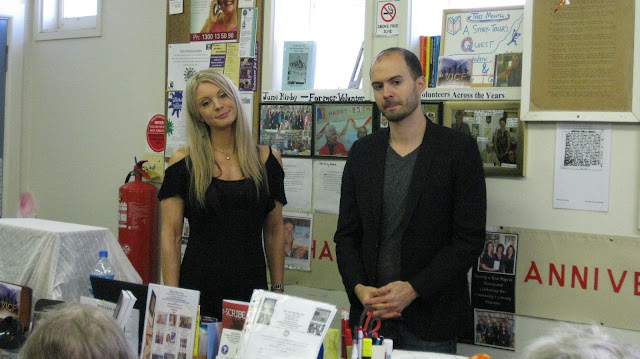Barry Dickins Reflection: A Literary Icon Outlines How he Gathered a Heart-breaking Tale - 11am, Saturday, 17 April 2021
Reflection by
“I just let her speak.” That was the simple, honest answer from Barry Dickins to a most difficult question. When doing research for his book, One Punch, how did he go about constructing an interview with a mother grieving the tragic, senseless loss of her son?
Having set up the meeting, he knocked on the door with a simple plan in mind. Not to assail her with questions. Not to interrupt her conversation. Not to force the issue. Just let her speak.
Yes, there were tears. And yes, there were long silences. And yes, there were painful moments as Caterina Politi recalled especially horrific aspects of the night when her 22-year-old son,David Cassai,was killed. But whenever Barry suggested that they stop, she insisted that they carry on. Her words must be heard, she said.
On Saturday April 17 an expectant crowd gathered at the Mentone Activity Hub to hear Barry speak about his book, in which he reveals the experiences and feelings of not only Caterina, but also other families and individuals who have lost precious people to the fatal phenomenon of the killer punch.
We were taken on a heartfelt journey through the eyes of a mother who will never come to terms with how needlessly her beautiful boy lost his life, and how traumatic every minute that followed was for her.
We heard of the innocent outing for her son in Rye, beginning on the evening of December 30, 2012, with mates he had know from school days, to celebrate the birthday of one of them. And of how it turned nasty when a mob of aggressive youths they came across in the street instigated events with a hip-and-shoulder on David and then continued to intimidate and harass.
David and his pals wanted none of it and backed off, but the mob had a taste for blood and struck out at them with their fists. Two friends were seriously felled, one sustaining a broken jaw. CCTV footage shows that despite walking backwards and holding his hands up to show he did not want to fight, Caterina’s son was killer-punched, virtually dead before his head hit the pavement.
“This is what we came here
for," his assailant boasted, as they ran off.
After David was airlifted to hospital and underwent emergency treatment, doctors told Caterina that her son was brain dead. David died at 3.55 on the afternoon of New Year’s Eve, 2012, just 15 hours after Caterina had received the first phone call.
His mates were severely traumatised, their youth spoilt. Some time later, Barry interviewed one of the friends who witnessed the blow. All the pent-up emotion surfaced, and he simply burst into tears, completely overwhelmed.
The assailants were unrepentant, right up to the court case where the killer pleaded guilty to manslaughter and affray and was sentenced to nine years and three months,with a non-parole period of six years.
Caterina remembers it all - the phone calls, the police lights, the overwhelming noise of the air ambulance helicopter, three doctors saying there was nothing they could do for her son, and, amidst the horror of it all, being rushed into agreeing to organ donation, which they ultimately did.
The nightmare never stopped, Caterina having to endure sitting near the unrepentant killer while the trial played out in court.A particularly galling moment came three years later, when she heard he was being let out of jail on weekend-leave to play football.
Yet Caterina has shown remarkable fortitude, going on to co-found the organisation
aimed at reducing this horrible social atrocity.
She was unable to accept the library’s invitation to attend due to a prior commitment, but not only was her spirit present with Barry’s sympathetic reading of her story, but she also sent along a SOPCK wristband for everyone in attendance.
Barry is a talented raconteur and had his audience in the palm of his hand, recounting how he was commissioned by publishers Hardie Grant to write the book, describing the challenges it presented, and reading the chapter outlining Caterina’s experiences.
His presentation, as part of the library’s
11th series of
underlined why he is considered an Australian literary icon. A multi-talented individual, he is not only an award-winning playwright, author and columnist, but a skilled artist, illustrator and cartoonist.
His theatrical skills, evident as he engaged the audience with his reading, stem from his days as a writer/actor with the early 1970s theatre companies at the Pram Factory and La Mama.
These were innovative groups that opened the door for many Australian playwrights and performers, dragging the nation out of the age of the ‘cultural cringe’, and affording local content the opportunity to be heard. Barry is proudly Australian and he writes Australian stories.
The subject matter of his writings are as diverse as they are interesting, including his best-known work, the award winning stage play Remember Ronald Ryan, a dramatization of the life and subsequent death of the last man executed in Australia.
He has also written dramas and comedies about other Aussie heroes as diverse as Joan Sutherland, Squizzy Taylor, Frank Thring and Brett Whitely.
As he proved at The Hub,
Barry Dickins is a master storyteller.






















Comments
Post a Comment